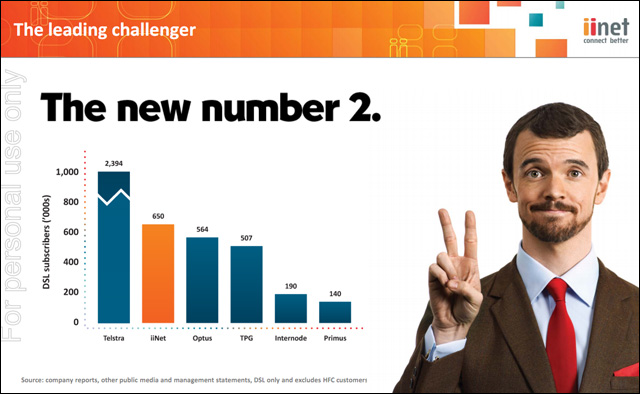news National broadband provider iiNet has halted trading of its shares on the Australian Stock Exchange today, following a report in the Financial Review newspaper that it was in the final stages of negotiations to acquire Canberra and rural NSW/Victoria-based telco TransACT.
Following iiNet’s request to the ASX for a halt on trading of its stock around lunchtime today (PDF), the AustralianIT has followed the Financial Review in the report, stating that the proposed deal between the pair was expected to be worth between $60 million and $80 million, with iiNet currently completing due diligence on the arrangement.
TransACT is one of the few major independent broadband and telecommunications services providers left in Australia, after iiNet, TPG and Optus have embarked on buying sprees over the past decade which has resulted in a significant consolidation of the market. The company operates an independent fibre to the node network in the ACT, serving the Canberra residential and business markets, as well as infrastructure in areas such as in rural Victoria, where the company’s purchase of HFC operator Neighbourhood Cable gave it a foothold.
TransACT’s website states it has revenues of about $100 million a year, about 150,000 residential customer, over 5,000 small to medium business customers, and a state and federal government roster of some 50 agencies. It typically focuses on selling a so-called ‘triple-play’ bundle of services to customers, with voice, video entertainment and broadband in the mix.
In many ways, the story of TransACT’s infrastructure rollout throughout the ACT mirrors the development of the National Broadband Network.
After being founded in the latter years of the 1990’s, TransACT initially rolled out a predominantly fibre (fibre to the curb) network in the ACT, following similar rollouts of high-speed broadband technology in the US markets. A small number of Australian cities — such as Mildura with Neighbourhood Cable — went through similar rollouts around the time.
However, unlike other major infrastructure owners in Australia such as Telstra, TransACT willingly opened its network for wholesale use, allowing a number of other ISPs to use its infrastructure. Following the initial rollout, TransACT has used a variety of different fixed broadband technologies — fibre to the node, ADSL, VDSL and fibre to gradually expand its footprint in the ACT. TransACT maintains close links with ACT energy utility ActewAGL.
Opinion/analysis to follow in a separate article.
Image credit: iiNet


I wonder how long iiBorg can keep assimilating. I have seen this with other companies that have floated themselves. The buy company after company as it doesn’t cost real money, you just buy them with a bunch of your shares. In the cases I have seen where other IT companies have done this they have crashed and burned after a number of years. They discovered it’s one thing to “buy” them with shares and it’s another to keep paying costs of the now grossly bigger company. All those companies you thought you got for nothing have to start paying for themselves quick smart.
Yeah. they are in for hard work integrating all those acquired ISPs. If you don’t integrate them you have to then maintain all the separate billing and support systems. In the dotcom era I contracted for a company which had acquired about 8 ISPs in Australia – they ended up with about 200 staff when they should have had 40… (this was from the liquidators report).
They made a complete mess of integrating Netspace. I don’t know how many customers they lost in that mess. I can only judge by the people I know personally as who knows what percentage the people complaining on Netspace represent. Of the people I know personally who were on Netspace, all of them (5 including me) had their speed drop to around 50KB/s of an evening. First month they denied any problem. Second month they had one guy on it, a Netspace employee who was determined to find the problem. Two months until it was “fixed”. They had been blaming Telstra at first, the final resolution was a secret as it was comercially sensitive… Yer right, didn’t pay for enough backhaul from Telstra like everyone thought is my bet. We were told from the start they would be making a loss on us as customers. During that time 4 had given up (me included) and moved to Internode. Magically all the problems they were saying were Telstras disappeared. The one who was left when it was “fiixed” still had exactly the same problem. He was told his problem must have been something else. He then moved to Internode and the problem went away. Oh, and the Internode account, the same price as we were paying on Netspace and iiNet, except all the quota was avaialble rather than split peak/offpeak. Maybe they are keeping a high percentage of customers, maybe they are losing heaps. I have no idea and I am sure they will say they lose a very small number. But then again all the problems we were experiencing were Telstras fault. Aren’t ISPs lucky Testra don’t jump on Whirlpool and call them on that constantly shifting the blame onto them. No wonder NBN Co wanted to put a clause in so ISPs couldn’t blame them for congestion, etc.
Comments are closed.